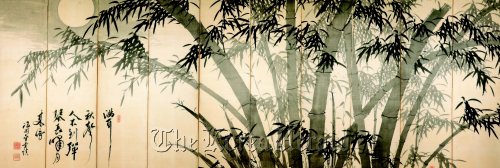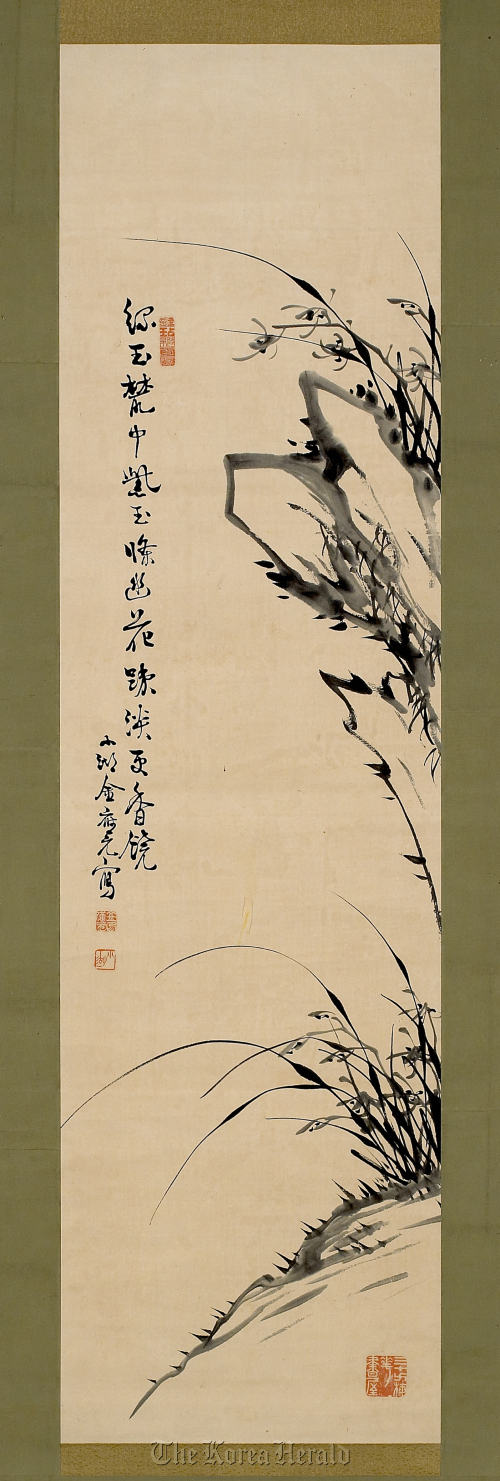 |
“Wolhajukrimdo,” a bamboo painting by Haegang Gim Gyu-jin on a 10-fold screen (Hakgojae Gallery) |
Hakgojae Gallery presents orchid, bamboo paintings in New Year celebrations
Hazy moonlight shimmers on a tranquil bamboo forest. The bamboo, so upright and leafy, seem to be swaying gently in the night breeze, but never losing grip completely. Haegang Gim Gyu-jin’s ten-fold-screen depicts a sentimental yet calm night that invites viewers into a moment of fantasy.
Bamboo and orchids were some of the subjects highly favored by Joseon Dynasty artists and scholars, including Gim, to feature in their artwork.
“Bamboo implies peace and stability, and it was regarded to bring peace to one’s family,” said Woo Chan-kyu, head of Hakgojae Gallery, at a press conference held last week in Sogyeok-dong, central Seoul.
“The orchid spreads its scent in the deep forest although it draws no one’s attention. It reflects the lives of noblemen who cultivate themselves morally in difficult circumstances; so it was loved by seonbi (Joseon Dynasty scholars) for a long time,” he added.
The gallery is showcasing orchid and bamboo paintings and writings by two modern artists ― Gim Eung-won (1855-1921) and Gim Gyu-jin (1868-1933) ― in hopes to make the New Year “as fragrant as an orchid’s scent and as peaceful as the wind bamboo creates.” The exhibition features 34 works by the two, including one they worked on together.
 |
“Seokrando,” an orchid painting by Soho Gim Eung-won (Hakgojae Gallery) |
The artists, better known by their pennames Soho and Haegang, respectively, were significant artists in the late Joseon Dyansty, which was quickly stepping into the modern age.
Soho was so famous for his orchid paintings that he was even known to have created works in place of Prince Regent Heungseon Daewongun (1820-1898). Spotted in some 20 works in the show, the artist’s orchids are slim and elegant, but blooming with overflowing energy.
Haegang, who opened one of the first photo studios at the time as well, was especially acclaimed for his bamboo paintings. While he inherited Joseon’s traditional style of bamboo painting, he also adapted the Chinese style at the time. His bamboo, therefore, are quiet but also ornamental, suitable for adding color to a boring wall. Haegang’s style influenced many established artists in the following generations including Lee Eung-no.
Although the two were indeed leaders in the field and the founders of the pictorial art and calligraphy association in 1918, they are not well known today, not to mention that their works are difficult to find.
Woo found the reason not in the artists themselves but in today’s overall tendency to overlook modern paintings and writings by Korean artists. Artworks from the modern age are very undervalued, he said.
It is reflected directly in the price of the works, as Woo hinted that except for Haegang’s ten-fold screen, which is expected to be sold for somewhere between 150 million and 200 million won, none of the exhibits will be priced above five million won.
Not much welcomed here, the works were taken to other countries, mostly to Japan during the Japanese colonization period, and were not brought back until Woo collected them a few years ago. For the show, the gallery placed some of the works in modern frames instead of traditional hanging scrolls, hoping it would appeal to today’s collectors.
“Contemporary art did not pop out from nowhere. It would be a good idea for us to start a sort of ‘finding-our-roots’ project, like what China has been doing. In order to do that, we have to go back in history, to the modern and ancient ages. We will continue holding these shows,” said Woo.
The exhibition runs through Feb. 19 at Hakgojae Gallery in Sogyeok-dong, central Seoul. For more information, call (02) 720-1524~6 or visit www.hakgojae.com.
By Park Min-young (
claire@heraldcorp.com)





![[Today’s K-pop] Blackpink’s Jennie, Lisa invited to Coachella as solo acts](http://res.heraldm.com/phpwas/restmb_idxmake.php?idx=644&simg=/content/image/2024/11/21/20241121050099_0.jpg)



